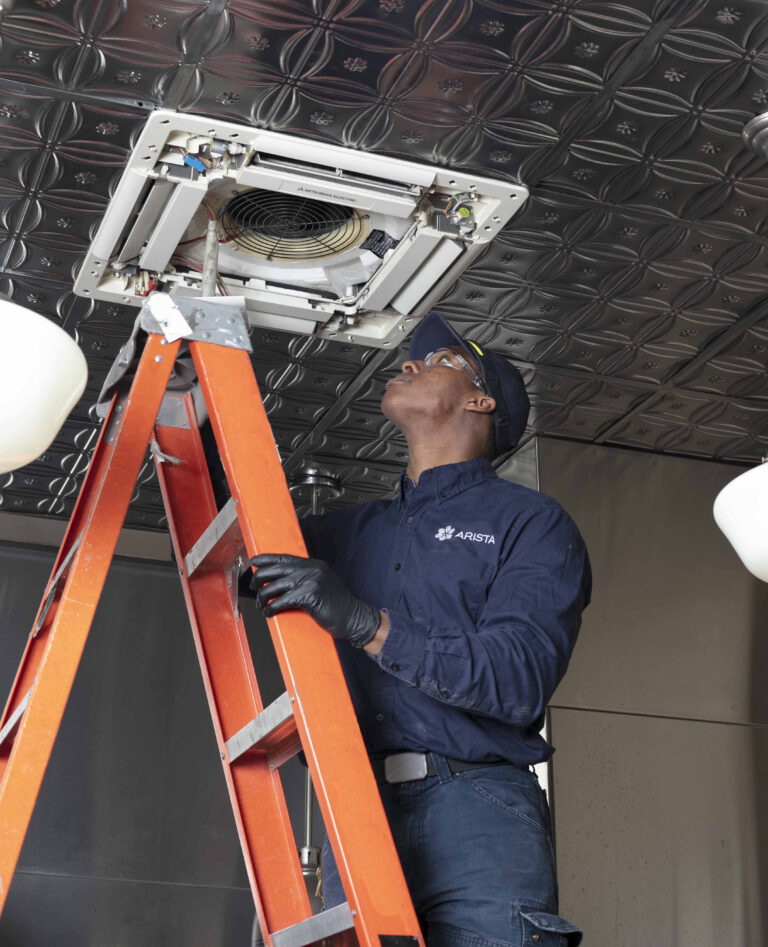How to Choose the Right HVAC System for Your Home or Office Needs
Selecting the excellent HVAC system for a home or workplace is no small job. It's a process that requires mindful assessment of individual home heating, air conditioning, and ventilation requirements, consideration of numerous system types, and evaluation of power performance.
Understanding the Essentials of HVAC Solutions
A cooling and heating system, an acronym for Home heating, Air Flow, and A/c, is an essential component in maintaining a healthy and comfortable interior environment. These systems work in unison to regulate the indoor temperature level, humidity levels, and air top quality, allowing occupants to readjust conditions to their liking. The home heating component offers heat throughout winters, while the a/c cools down the inside during hot durations. Air flow, on the other hand, makes sure a continual exchange of indoor air with fresh outside air, eliminating toxins and keeping good air quality. The complexity of a HVAC system can vary, ranging from easy single-room systems to detailed systems that serve large commercial buildings. Recognizing these fundamentals is the very first step in selecting the ideal cooling and heating system.
Evaluating Your Indoor Environment Requirements
Moving from a basic understanding of Cooling and heating systems, the next step includes a mindful analysis of your specific interior climate requirements. A bigger area might demand a more robust system, while a smaller area may not call for as much power. Areas with severe temperatures might need systems with greater performance.
Discovering Various Sorts Of HVAC Systems
Navigating with the intricacies of a/c systems can be tough. It is essential to understand the variety of a/c selections readily available, and to make an informed selection based upon expense and performance contrasts. This exploration will certainly provide a clearer perspective on what each kind of a/c system provides.
Recognizing A/c Varieties
Ever wondered concerning the plethora of alternatives when it pertains to heating and cooling systems? There are essentially 4 major types to think about. Central heating and cooling systems, the most usual, utilize ductwork to distribute cozy or amazing air throughout the residence. Ductless, mini-split systems, on the other hand, give temperature level control for private spaces, perfect for homes with 'locations'. Heatpump make use of power to move heat from a trendy area to a warm room, making the great space colder and the warm room warmer. Packaged home heating and air conditioning systems contain the blower, heating, and cooling parts all in one unit. Each kind has its distinct benefits, and comprehending these can aid one make a notified choice.

Price and Effectiveness Contrast
When discovering the substantial array of A/c systems, it is critical to take into consideration both price and efficiency. On the contrary, more expensive systems tend to be much more energy-efficient, saving money in the long run.
As an example, central air systems, though costly, are generally more efficient than window devices. Warm pumps are expensive however provide heating and cooling down capacities, making them a cost-efficient, year-round remedy.
In addition, it's crucial to check out the system's Seasonal Power Performance Ratio (SEER) A greater SEER score suggests better power effectiveness, which equates to reduced operating expense (DMAK's HVAC Edwardsville IL Experts). For this reason, investing wisely in an appropriate cooling and heating system relates to long-lasting savings.
Energy-Efficiency and Your Cooling And Heating System
The relevance of energy-efficiency in a/c systems can not be overemphasized. The initial action click site towards an energy-efficient heating and cooling system is understanding the rankings and choosing the right versions. This will not just benefit the atmosphere yet likewise cause considerable price savings.
Recognizing Energy-Efficiency Ratings
Why is energy-efficiency vital in your HVAC system? Energy-efficiency ratings offer as an essential guide to ascertain the possible power usage and cost savings of a Heating and cooling system. This rating, usually expressed in SEER (Seasonal Power Performance Proportion) for air conditioners or AFUE (Yearly Gas Use Effectiveness) for heating units, offers a clear indication of the device's energy effectiveness.
Choosing Energy-Efficient Models
Exactly how does one go about choosing energy-efficient cooling and heating designs? Recognizing power ratings such as EER, seer, and hspf is important. These scores show the performance of the system, with higher worths standing for better efficiency. It's additionally vital to think about the dimension of the HVAC system, as larger units often tend to be more energy-efficient. Nevertheless, the system size should be proper for the space to prevent power wastage. An additional factor to consider is the kind of heating and cooling system. As an example, heatpump are usually much more energy-efficient than traditional systems. Last but not least, seek versions that have energy-saving attributes, such as variable rate motors or programmable thermostats. Making an energy-efficient selection can substantially reduce energy usage and environmental effect.
Price Advantages Analysis

After thinking about the numerous elements that affect the power performance of heating and cooling systems, it is useful to analyze the price advantages that come with these selections. An effective heating and cooling system, although at first more expensive, can save substantial quantities in power expenses over its life expectancy. Moreover, it minimizes the environmental influence by using much less energy, providing an extra layer of advantages. Many federal governments and utility business likewise provide rebates or motivations for executing energy-efficient systems, additionally reducing the general expense. Over time, a high-efficiency HVAC system can pay for itself through energy financial savings, while additionally raising the residential property's worth. When selecting a HVAC system, the expense benefits of energy efficiency must be a key factor to consider.
Cost Factors To Consider When Picking a HVAC System

Installment and Maintenance Aspects of Cooling And Heating Systems
Navigating the installation and upkeep of cooling and heating systems can be a complex job. The procedure usually calls for a specific understanding of the system's requirements, which might include ductwork setup, electric wiring, and proper positioning. Experts in the field are often hired to handle this due to the technical skills needed.
Ignoring maintenance can lead to endangered performance, greater power usage, and at some point, system failure. Understanding the subtleties of setup and preventive upkeep is vital when selecting a HVAC system.
Verdict
In final thought, selecting the best heating and cooling system requires a thorough understanding of the fundamentals, assessment of indoor environment needs, expedition of various system types, and consideration of energy performance and price. It's vital to think about both setup and upkeep facets. By thoroughly examining these variables, one can effectively choose the heating and cooling system that gives optimum convenience and performance in both business and household settings.
The intricacy of a HVAC system can vary, ranging from simple single-room units to intricate systems that serve huge business buildings. DMAK's HVAC Edwardsville IL Experts. Energy-efficiency rankings offer as an essential guide to ascertain the possible power usage and savings of a Heating and cooling system.After taking into account the various factors that influence the power effectiveness of A/c systems, it is useful to analyze the cost advantages that come with these selections. When choosing a HVAC system, the cost advantages of energy efficiency need to be a crucial consideration
In verdict, selecting the best HVAC system needs a complete understanding of the fundamentals, assessment of interior climate requirements, exploration of various system types, and factor to consider of energy efficiency and expense.